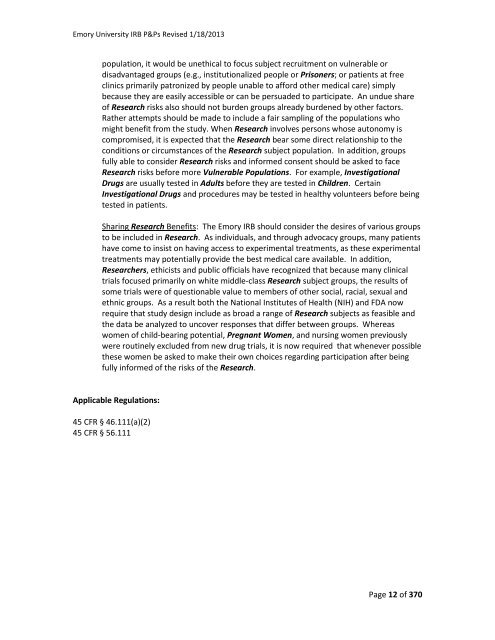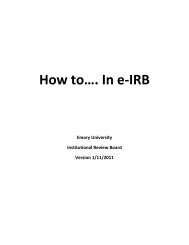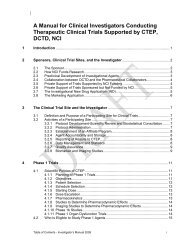- Page 1 and 2: EMORY UNIVERSITY INSTITUTIONAL REVI
- Page 3 and 4: Emory University IRB P&Ps Revised 1
- Page 5 and 6: Emory University IRB P&Ps Revised 1
- Page 7 and 8: Emory University IRB P&Ps Revised 1
- Page 9 and 10: Emory University IRB P&Ps Revised 1
- Page 11: Emory University IRB P&Ps Revised 1
- Page 15 and 16: Emory University IRB P&Ps Revised 1
- Page 17 and 18: Emory University IRB P&Ps Revised 1
- Page 19 and 20: Emory University IRB P&Ps Revised 1
- Page 21 and 22: Emory University IRB P&Ps Revised 1
- Page 23 and 24: Emory University IRB P&Ps Revised 1
- Page 25 and 26: Emory University IRB P&Ps Revised 1
- Page 27 and 28: Emory University IRB P&Ps Revised 1
- Page 29 and 30: Emory University IRB P&Ps Revised 1
- Page 31 and 32: Emory University IRB P&Ps Revised 1
- Page 33 and 34: Emory University IRB P&Ps Revised 1
- Page 35 and 36: Emory University IRB P&Ps Revised 1
- Page 37 and 38: Emory University IRB P&Ps Revised 1
- Page 39 and 40: Emory University IRB P&Ps Revised 1
- Page 41 and 42: Emory University IRB P&Ps Revised 1
- Page 43 and 44: Emory University IRB P&Ps Revised 1
- Page 45 and 46: Emory University IRB P&Ps Revised 1
- Page 47 and 48: Emory University IRB P&Ps Revised 1
- Page 49 and 50: Emory University IRB P&Ps Revised 1
- Page 51 and 52: Emory University IRB P&Ps Revised 1
- Page 53 and 54: Emory University IRB P&Ps Revised 1
- Page 55 and 56: Emory University IRB P&Ps Revised 1
- Page 57 and 58: Emory University IRB P&Ps Revised 1
- Page 59 and 60: Emory University IRB P&Ps Revised 1
- Page 61 and 62: Emory University IRB P&Ps Revised 1
- Page 63 and 64:
Emory University IRB P&Ps Revised 1
- Page 65 and 66:
Emory University IRB P&Ps Revised 1
- Page 67 and 68:
Emory University IRB P&Ps Revised 1
- Page 69 and 70:
Emory University IRB P&Ps Revised 1
- Page 71 and 72:
Emory University IRB P&Ps Revised 1
- Page 73 and 74:
Emory University IRB P&Ps Revised 1
- Page 75 and 76:
Emory University IRB P&Ps Revised 1
- Page 77 and 78:
Emory University IRB P&Ps Revised 1
- Page 79 and 80:
Emory University IRB P&Ps Revised 1
- Page 81 and 82:
Emory University IRB P&Ps Revised 1
- Page 83 and 84:
Emory University IRB P&Ps Revised 1
- Page 85 and 86:
Emory University IRB P&Ps Revised 1
- Page 87 and 88:
Emory University IRB P&Ps Revised 1
- Page 89 and 90:
Emory University IRB P&Ps Revised 1
- Page 91 and 92:
Emory University IRB P&Ps Revised 1
- Page 93 and 94:
Emory University IRB P&Ps Revised 1
- Page 95 and 96:
Emory University IRB P&Ps Revised 1
- Page 97 and 98:
Emory University IRB P&Ps Revised 1
- Page 99 and 100:
Emory University IRB P&Ps Revised 1
- Page 101 and 102:
Emory University IRB P&Ps Revised 1
- Page 103 and 104:
Emory University IRB P&Ps Revised 1
- Page 105 and 106:
Emory University IRB P&Ps Revised 1
- Page 107 and 108:
Emory University IRB P&Ps Revised 1
- Page 109 and 110:
Emory University IRB P&Ps Revised 1
- Page 111 and 112:
Emory University IRB P&Ps Revised 1
- Page 113 and 114:
Emory University IRB P&Ps Revised 1
- Page 115 and 116:
Emory University IRB P&Ps Revised 1
- Page 117 and 118:
Emory University IRB P&Ps Revised 1
- Page 119 and 120:
Emory University IRB P&Ps Revised 1
- Page 121 and 122:
Emory University IRB P&Ps Revised 1
- Page 123 and 124:
Emory University IRB P&Ps Revised 1
- Page 125 and 126:
Emory University IRB P&Ps Revised 1
- Page 127 and 128:
Approval Pending Modification (spec
- Page 129 and 130:
Emory University IRB P&Ps Revised 1
- Page 131 and 132:
Emory University IRB P&Ps Revised 1
- Page 133 and 134:
Emory University IRB P&Ps Revised 1
- Page 135 and 136:
Emory University IRB P&Ps Revised 1
- Page 137 and 138:
Emory University IRB P&Ps Revised 1
- Page 139 and 140:
Emory University IRB P&Ps Revised 1
- Page 141 and 142:
Emory University IRB P&Ps Revised 1
- Page 143 and 144:
Emory University IRB P&Ps Revised 1
- Page 145 and 146:
Emory University IRB P&Ps Revised 1
- Page 147 and 148:
Emory University IRB P&Ps Revised 1
- Page 149 and 150:
Emory University IRB P&Ps Revised 1
- Page 151 and 152:
Emory University IRB P&Ps Revised 1
- Page 153 and 154:
Emory University IRB P&Ps Revised 1
- Page 155 and 156:
Emory University IRB P&Ps Revised 1
- Page 157 and 158:
Emory University IRB P&Ps Revised 1
- Page 159 and 160:
Emory University IRB P&Ps Revised 1
- Page 161 and 162:
Emory University IRB P&Ps Revised 1
- Page 163 and 164:
Emory University IRB P&Ps Revised 1
- Page 165 and 166:
Emory University IRB P&Ps Revised 1
- Page 167 and 168:
Emory University IRB P&Ps Revised 1
- Page 169 and 170:
Emory University IRB P&Ps Revised 1
- Page 171 and 172:
Emory University IRB P&Ps Revised 1
- Page 173 and 174:
Emory University IRB P&Ps Revised 1
- Page 175 and 176:
Emory University IRB P&Ps Revised 1
- Page 177 and 178:
Emory University IRB P&Ps Revised 1
- Page 179 and 180:
Emory University IRB P&Ps Revised 1
- Page 181 and 182:
Emory University IRB P&Ps Revised 1
- Page 183 and 184:
Emory University IRB P&Ps Revised 1
- Page 185 and 186:
Emory University IRB P&Ps Revised 1
- Page 187 and 188:
Emory University IRB P&Ps Revised 1
- Page 189 and 190:
Emory University IRB P&Ps Revised 1
- Page 191 and 192:
Emory University IRB P&Ps Revised 1
- Page 193 and 194:
Emory University IRB P&Ps Revised 1
- Page 195 and 196:
Emory University IRB P&Ps Revised 1
- Page 197 and 198:
Emory University IRB P&Ps Revised 1
- Page 199 and 200:
Emory University IRB P&Ps Revised 1
- Page 201 and 202:
Emory University IRB P&Ps Revised 1
- Page 203 and 204:
Emory University IRB P&Ps Revised 1
- Page 205 and 206:
Emory University IRB P&Ps Revised 1
- Page 207 and 208:
Emory University IRB P&Ps Revised 1
- Page 209 and 210:
Emory University IRB P&Ps Revised 1
- Page 211 and 212:
Emory University IRB P&Ps Revised 1
- Page 213 and 214:
Emory University IRB P&Ps Revised 1
- Page 215 and 216:
Emory University IRB P&Ps Revised 1
- Page 217 and 218:
Emory University IRB P&Ps Revised 1
- Page 219 and 220:
Emory University IRB P&Ps Revised 1
- Page 221 and 222:
Emory University IRB P&Ps Revised 1
- Page 223 and 224:
Emory University IRB P&Ps Revised 1
- Page 225 and 226:
Emory University IRB P&Ps Revised 1
- Page 227 and 228:
Emory University IRB P&Ps Revised 1
- Page 229 and 230:
Emory University IRB P&Ps Revised 1
- Page 231 and 232:
Emory University IRB P&Ps Revised 1
- Page 233 and 234:
Emory University IRB P&Ps Revised 1
- Page 235 and 236:
Emory University IRB P&Ps Revised 1
- Page 237 and 238:
Emory University IRB P&Ps Revised 1
- Page 239 and 240:
Emory University IRB P&Ps Revised 1
- Page 241 and 242:
Emory University IRB P&Ps Revised 1
- Page 243 and 244:
Emory University IRB P&Ps Revised 1
- Page 245 and 246:
Emory University IRB P&Ps Revised 1
- Page 247 and 248:
Emory University IRB P&Ps Revised 1
- Page 249 and 250:
Emory University IRB P&Ps Revised 1
- Page 251 and 252:
Emory University IRB P&Ps Revised 1
- Page 253 and 254:
Emory University IRB P&Ps Revised 1
- Page 255 and 256:
Emory University IRB P&Ps Revised 1
- Page 257 and 258:
Emory University IRB P&Ps Revised 1
- Page 259 and 260:
Emory University IRB P&Ps Revised 1
- Page 261 and 262:
Emory University IRB P&Ps Revised 1
- Page 263 and 264:
Emory University IRB P&Ps Revised 1
- Page 265 and 266:
Emory University IRB P&Ps Revised 1
- Page 267 and 268:
Emory University IRB P&Ps Revised 1
- Page 269 and 270:
Emory University IRB P&Ps Revised 1
- Page 271 and 272:
Emory University IRB P&Ps Revised 1
- Page 273 and 274:
Emory University IRB P&Ps Revised 1
- Page 275 and 276:
Emory University IRB P&Ps Revised 1
- Page 277 and 278:
Emory University IRB P&Ps Revised 1
- Page 279 and 280:
Emory University IRB P&Ps Revised 1
- Page 281 and 282:
Emory University IRB P&Ps Revised 1
- Page 283 and 284:
Emory University IRB P&Ps Revised 1
- Page 285 and 286:
Emory University IRB P&Ps Revised 1
- Page 287 and 288:
Emory University IRB P&Ps Revised 1
- Page 289 and 290:
Emory University IRB P&Ps Revised 1
- Page 291 and 292:
Emory University IRB P&Ps Revised 1
- Page 293 and 294:
Emory University IRB P&Ps Revised 1
- Page 295 and 296:
Emory University IRB P&Ps Revised 1
- Page 297 and 298:
Emory University IRB P&Ps Revised 1
- Page 299 and 300:
Emory University IRB P&Ps Revised 1
- Page 301 and 302:
Emory University IRB P&Ps Revised 1
- Page 303 and 304:
Emory University IRB P&Ps Revised 1
- Page 305 and 306:
Emory University IRB P&Ps Revised 1
- Page 307 and 308:
Emory University IRB P&Ps Revised 1
- Page 309 and 310:
Emory University IRB P&Ps Revised 1
- Page 311 and 312:
Emory University IRB P&Ps Revised 1
- Page 313 and 314:
Emory University IRB P&Ps Revised 1
- Page 315 and 316:
Emory University IRB P&Ps Revised 1
- Page 317 and 318:
Emory University IRB P&Ps Revised 1
- Page 319 and 320:
Emory University IRB P&Ps Revised 1
- Page 321 and 322:
Emory University IRB P&Ps Revised 1
- Page 323 and 324:
Emory University IRB P&Ps Revised 1
- Page 325 and 326:
Emory University IRB P&Ps Revised 1
- Page 327 and 328:
Emory University IRB P&Ps Revised 1
- Page 329 and 330:
Emory University IRB P&Ps Revised 1
- Page 331 and 332:
Emory University IRB P&Ps Revised 1
- Page 333 and 334:
Emory University IRB P&Ps Revised 1
- Page 335 and 336:
Emory University IRB P&Ps Revised 1
- Page 337 and 338:
Emory University IRB P&Ps Revised 1
- Page 339 and 340:
Emory University IRB P&Ps Revised 1
- Page 341 and 342:
Emory University IRB P&Ps Revised 1
- Page 343 and 344:
Emory University IRB P&Ps Revised 1
- Page 345 and 346:
Emory University IRB P&Ps Revised 1
- Page 347 and 348:
Emory University IRB P&Ps Revised 1
- Page 349 and 350:
Emory University IRB P&Ps Revised 1
- Page 351 and 352:
Emory University IRB P&Ps Revised 1
- Page 353 and 354:
Emory University IRB P&Ps Revised 1
- Page 355 and 356:
Emory University IRB P&Ps Revised 1
- Page 357 and 358:
Emory University IRB P&Ps Revised 1
- Page 359 and 360:
Emory University IRB P&Ps Revised 1
- Page 361 and 362:
Emory University IRB P&Ps Revised 1
- Page 363 and 364:
Emory University IRB P&Ps Revised 1
- Page 365 and 366:
Emory University IRB P&Ps Revised 1
- Page 367 and 368:
Emory University IRB P&Ps Revised 1
- Page 369 and 370:
Emory University IRB P&Ps Revised 1




